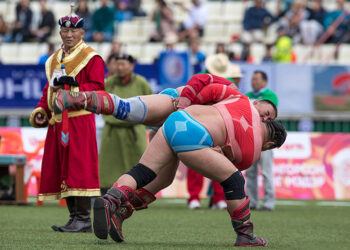
Six minutes into extra time, and for the first time all evening, Georgia Stanway had room to breathe. It had been a taut and suffocating night, in many ways a horrible night, a night when the tension knots itself in the stomach like a tumour. But finally, a little after 10pm, the angst and the doubt and the foul throws and the blur of substitutions had sharpened to a single moment of clarity.
All game, Stanway had found her way blocked and thwarted by a forest of legs, by a barbed‑wire fence of red shirts. All game, Aitana Bonmatí in midfield had clung to her like a catsuit. One touch was a luxury. Two pretty much guaranteed you a bruise on the ankle. But now, as a Spanish move broke down and the ball slipped into her stride 40 yards from goal, there was only pure air in front of her.
Stanway pulled back her right leg, summoned all the strength left in it, and entrusted the rest to her education: those long winter mornings in the gym in Manchester, training sessions in front of a crowd of zero, the little bolt of instinct that takes over the body of an athlete at exactly the moment when they stop thinking and start dreaming.
The ball soared with a little backspin and a little curve, holding up a little in the air. Out in the world, an audience of millions hung on these devastating little quirks of physics and geometry. Is it silly that so much happiness can rest on something so tiny and trivial? One shot flies wide and another smacks the net, and on these fates entire projects and careers are made and broken. These inches are nothing but the meaning we give to them. And as Sandra Paños threw herself at a cause she already knew was lost, a nation slowly began to rise from its seats.
What happened next? The England substitutes and coaches piled up on the touchline like a human bonfire. The noise seemed to swallow the stadium from every direction: not the guttural rasp of 30,000 men but a polyphony, a gasp and a scream and a roar and a wail all at once. The score was England 2 Spain 1, and everything else, really, was ballast: the blank reels of a film in which only the final scene was of any value.
So yes, everything else can wait for now. Rachel Daly’s shocking night at left-back. Lauren Hemp’s identity crisis. English football’s curious inability to produce technical midfielders. The way every time England got the ball they somehow seemed to be facing their own goal, as if under the spell of powerful repulsive magnets. What to do with Ellen White in general. For England are two games away from becoming European champions, and if ever there was a time for setting introspection to one side, this is it.
Spain came with purpose, a plan and possibly even a grudge. Certainly this would explain the disdainful relish with which they snapped away in midfield, tracked and grappled England’s front three, scythed down their counter-attacks. For an hour Spain asserted their status and intent. Ona Batlle put Hemp on the floor. Olga Carmona barely let go of Beth Mead’s shirt all night. Bonmatí scuttled around in midfield, making Stanway and Keira Walsh feel the hot breath on her neck.
And when Spain got the ball, they passed it. And passed it some more. Against Germany and Denmark in the group stage, those simple little triangles and semicircles had so often felt purposeless and neutered. Here, the passing was in many ways the point: a demonstration of supremacy, the equivalent of walking into England’s front room and resting their muddy boots on the coffee table. Bonmatí and Mariona Caldentey were brilliant. Mapi León and Irene Paredes saw off the expected aerial barrage, and deserved better than the bruises and scars with which they will wake on Thursday morning.
Spain scored, a mugging by Athenea del Castillo and a cool finish by Esther González. They ran down the clock. With 70 minutes played the fourth official’s board was raised. Teresa Abelleira started to jog from the pitch, only for her teammates on the bench to leap to their feet,scream at her to slow down. The hapless Daly was replaced and threw a bib over her face, as if hoping that when she removed it she would be transported to an alternative reality.
The funny thing? It worked. Ella Toone’s equalising goal was scruffy but the natural product of a Spain team that had ceased to attack: defending with six, digging a trench around their 18-yard box. Extra time arrived, freighted with danger but also loaded with possibility: limbs tiring, spaces opening up, the crowd raising its volume.
And so as England cavorted on a Brighton pitch soaked by their sweat, it was simultaneously possible to see all the other realities that could have unfolded instead: the paths not taken, the disasters averted. But the path to salvation was always there. It just required a player of Stanway’s vision and composure to find it.
[“source=theguardian”]






